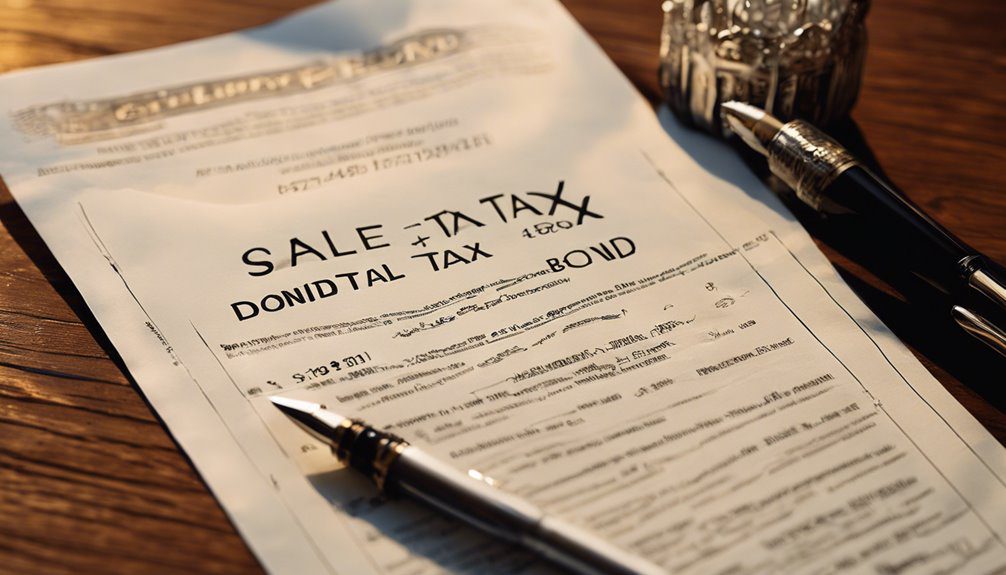When you're running a business in South Carolina, understanding the significance of a sales tax bond can be crucial. It isn't just a regulatory requirement; it's a safeguard for both your business and the state. You might be wondering who exactly needs this bond and what it entails. The implications of having one extend beyond compliance, potentially affecting your relationship with customers and other stakeholders. So, what does it really take to secure a sales tax bond, and how can it benefit your operations?
What Is a Sales Tax Bond?

A sales tax bond is a type of surety bond that businesses often need to collect and remit sales tax to the state. When you operate a business that sells goods or services, you're responsible for collecting sales tax from your customers. This bond acts as a guarantee that you'll fulfill your tax obligations.
If you fail to pay the collected sales tax, the bond provides a financial safety net for the state, allowing them to recover the owed amount.
Essentially, you're entering into a three-party agreement involving you (the principal), the state (the obligee), and the surety company that issues the bond. By obtaining this bond, you show that you're trustworthy and committed to compliance with local tax regulations. The bond serves a similar purpose to cigarette tax bonds in ensuring that distributors meet their tax obligations.
The bond amount often reflects your expected sales tax liability, which can vary based on your business size and type.
If you don't meet your tax responsibilities, the state can claim against the bond to recover the unpaid taxes. Consequently, it's crucial to ensure you're always remitting the correct amounts, as any claims against your bond could affect your business's credibility and financial standing.
Importance of Sales Tax Bonds
Sales tax bonds play a crucial role in ensuring businesses meet their tax obligations. By securing these bonds, you demonstrate your commitment to complying with local tax laws. This isn't just about following rules; it's about building trust with your customers and suppliers.
When you're bonded, it shows that you prioritize financial responsibility, which can enhance your business reputation.
Additionally, sales tax bonds protect the state and local governments. If your business fails to pay sales taxes, the bond ensures that the government can recover the owed amount without significant losses.
This financial safety net helps maintain the integrity of the tax system, allowing local services to be funded properly.
Moreover, having a sales tax bond can give you a competitive edge. Many clients prefer working with businesses that are bonded, as it gives them peace of mind knowing that you're reliable.
It can also be beneficial when applying for loans or credit, as lenders often view bonded businesses as lower risk. Furthermore, securing a sales tax bond can enhance your business's credibility by demonstrating your commitment to compliance with local laws and regulations.
Who Needs a Sales Tax Bond?

Businesses that regularly engage in selling goods or services often need a sales tax bond. If you operate a retail store, an online shop, or a service-based company that collects sales tax from customers, you're likely required to secure this bond. It acts as a financial safety net, ensuring that you remit collected sales taxes to the appropriate state authorities.
States typically mandate sales tax bonds to protect consumers and the government from potential tax fraud or mismanagement. If you fail to pay the collected sales tax, the bond provides a claim that can be made against it. This means that if you don't meet your tax obligations, the bond company can step in to cover the amount owed.
Additionally, if you're a new business owner or have a poor credit history, you may face stricter bonding requirements. Even if you're an established business, changes in operations, such as expanding your product line or changing your business structure, might necessitate a new bond. Understanding your obligations regarding mileage tax bonds is also important, as they may be required depending on your business activities.
Ultimately, understanding whether you need a sales tax bond is crucial for compliance and maintaining a good standing with tax authorities.
Legal Requirements in South Carolina
In South Carolina, understanding the legal requirements for securing a sales tax bond is vital for compliance. You must know that a sales tax bond guarantees that you'll remit collected sales tax to the state. This bond is typically required for businesses that sell tangible goods and certain services.
To obtain a sales tax bond, you'll need to provide specific information, including your business details and the estimated amount of sales tax you expect to collect. The bond amount is usually set at a percentage of your anticipated tax liability, with a minimum amount established by the state.
Additionally, you'll need to maintain good credit and might be subject to a background check, as bonding companies assess your financial responsibility. It's essential to work with a reputable bonding agency that understands South Carolina's regulations. Oklahoma Sales Tax Bond is another example of a bond that protects the state against unpaid sales tax obligations.
Once you've secured your bond, you must file it with the South Carolina Department of Revenue.
How to Obtain a Sales Tax Bond

Securing a sales tax bond involves a straightforward process that starts with gathering necessary documentation.
You'll need to prepare your business information, including your legal name, address, and structure. Additionally, have your business license and tax identification number ready. This information helps the surety company assess your application.
Next, reach out to a reputable surety bond provider. You can often find these companies online.
Once you've selected a provider, complete their application form. Be prepared to provide personal and financial details, as the surety will evaluate your creditworthiness.
After submitting your application, the surety will review your information and may ask for further documentation. This often includes financial statements or proof of income.
Once approved, you'll receive a quote for the bond premium.
If you agree to the terms, you'll sign the bond agreement and make the required payment. The surety will then issue the sales tax bond, which you can submit to the South Carolina Department of Revenue.
Costs Associated With Sales Tax Bonds
After you've obtained your sales tax bond, it's important to understand the costs involved. Sales tax bonds come with a premium, which is typically a percentage of the bond amount. This percentage can range from 1% to 10%, depending on factors like your credit score, business history, and the bond amount itself.
If you have excellent credit, you'll likely pay a lower premium, whereas a poor credit score might lead to higher costs.
Besides the premium, you might also encounter some additional fees, such as application fees, underwriting fees, or even annual renewal fees. These costs can vary by bond provider, so it's wise to shop around for the best deal.
Keep in mind that the bond amount isn't a fee you pay upfront; it represents the amount your bond guarantees to the state. If you fail to comply with state regulations, this amount could be claimed against your bond.
Process of Claiming on a Bond

When you need to file a claim on your sales tax bond, the process typically starts by notifying the bond provider. Reach out to them as soon as you identify a valid reason for your claim, such as unpaid sales tax or compliance issues. They'll guide you through the necessary steps and documentation required.
Next, gather all relevant information. This includes details about the situation that triggered the claim, any communications with the state tax agency, and any supporting documents like financial records.
Make sure to keep everything organized, as this will help expedite the process.
Once you've compiled the necessary information, submit your claim to the bond provider. It's crucial to follow their specific guidelines, as different providers may have unique requirements.
After submitting, stay in touch with them for updates on the claim's status.
Common Misconceptions Explained
Misunderstandings about sales tax bonds can lead to confusion and costly mistakes for businesses. One common misconception is that a sales tax bond is a tax payment. In reality, it's a guarantee that you'll collect and remit sales tax as required by law. If you fail to do so, the bond provides a financial safety net for the state, not your business.
Another myth is that all businesses need a sales tax bond. This isn't true; only certain industries or businesses with a history of non-compliance may be required to obtain one.
You might think that once you get a bond, you're set for good. However, it's important to remember that maintaining your bond may require you to stay compliant with all sales tax regulations.
Some believe that a sales tax bond protects them from audits or penalties, which is incorrect. The bond doesn't shield you from the consequences of tax violations; it simply ensures that the state can recover losses if you fail to pay taxes owed.
Understanding these misconceptions can save you time, money, and headaches down the road. Stay informed to keep your business running smoothly.
Maintaining Compliance With Sales Tax Laws

Understanding the realities of sales tax bonds sets the stage for maintaining compliance with sales tax laws. You need to keep track of your sales tax obligations to avoid penalties and protect your business.
Start by registering for a sales tax permit in your state. This is your first step toward ensuring you're authorized to collect sales tax.
Next, familiarize yourself with the specific sales tax rates applicable to your products or services. These rates can differ by location and product type, so check regularly for updates. It's essential to accurately calculate sales tax on each transaction you make.
Don't forget to keep detailed records of all sales, including the amount of sales tax collected. This documentation will help you when it's time to file your returns.
Establish a routine for filing your sales tax returns, whether monthly or quarterly; missing deadlines can lead to fines.
Lastly, stay informed about any changes in tax laws or regulations. You can subscribe to newsletters or join local business groups for updates.
Benefits of Having a Sales Tax Bond
Having a sales tax bond offers several advantages that can significantly benefit your business. First, it enhances your credibility with both customers and state tax authorities. When you have a bond in place, it demonstrates your commitment to compliance and responsible business practices, which can foster trust and encourage customer loyalty.
Additionally, a sales tax bond helps protect your business from potential tax-related liabilities. If you fail to remit sales tax, the bond can cover the costs, reducing your financial exposure. This safety net can be particularly reassuring, especially for new businesses just starting out.
Moreover, having a sales tax bond can streamline your interactions with tax agencies. Many states require businesses to secure a bond before granting sales tax permits, so having one can expedite the approval process. This can save you time and hassle, allowing you to focus on growing your business instead.
Lastly, a sales tax bond can improve your chances of securing financing. Lenders often look favorably upon businesses that are compliant with tax regulations, viewing the bond as a sign of stability and reliability.
Conclusion
In summary, securing a sales tax bond in South Carolina is vital for your business's credibility and compliance. It not only protects the state against unpaid taxes but also enhances your standing with customers and tax authorities. By understanding the requirements and process, you can ensure smooth operations and safeguard your business's future. Don't overlook the importance of this bond; it's a key step in building a trustworthy and successful venture.


